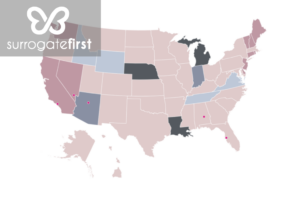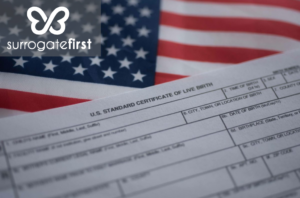The time it takes to find a surrogate can be as short as 30 days or as long as 2 years when working with an agency. This range exists because every surrogacy journey is different. Factors such as the availability of surrogates, your preferences, your location, and how prepared you are to move forward all affect the timeline. While it is natural to want to move quickly, matching is about finding the right person who will share one of the most important experiences of your life.
Do Wait Times Differ Between Agencies?
Yes, and the difference can be significant. Larger and more established agencies often have a bigger network of pre-screened surrogates who are ready to be matched. This usually means a shorter wait time compared to smaller agencies that work with fewer candidates.
The way an agency organizes its screening, matching, and coordination with clinics also plays an important role in how quickly a match can be made. Agencies with efficient systems and proactive communication are able to connect intended parents with surrogates much faster.
How Do Intended Parents Influence the Length of the Surrogacy Journey?
Your own readiness can speed up or slow down the process:
- Finances
Having your budget ready means you can cover agency fees, legal costs, and medical expenses right away. Waiting to arrange funding can delay your match for months. - Embryo Availability
If you already have embryos created, tested, and stored, you can move to the medical stage much faster. If not, you will need extra time for egg retrieval, fertilization, and any genetic testing. - Clinic Coordination
Your IVF clinic should work closely with your agency and surrogate. Poor communication or scheduling delays can add weeks or even months to your journey.
How Do Surrogates Influence the Length of the Journey?
The surrogate’s background, experience, and readiness also affect how quickly a match can be made:
- Repeat vs. First-Time Surrogate
A repeat surrogate often moves through early stages faster since she already understands the process. First-time surrogates may need more time for education, counseling, and preparation. - State of Residence
Surrogates who live in surrogacy-friendly states such as California or Florida often match faster because the legal process is simpler. In states with unclear or restrictive laws, extra legal steps may be required. Find all the information state by state here. - Pre-Screening Process
Surrogates who have already completed medical, psychological, and background checks are ready to move straight into matching. Those who still need screening will take longer before they can be matched.
What is a Unicorn in Surrogacy?
In surrogacy, a “unicorn” is a surrogate who meets every preference an intended parent could hope for. This could mean the perfect location, ideal health history, prior surrogacy experience, and a personality that fits perfectly. While finding a unicorn can be exciting, waiting for one can extend your timeline. Being flexible with preferences often leads to a faster match without sacrificing quality.
Key Factors That Impact How Long It Takes to Find a Match
- The size and efficiency of your agency
The agency you choose plays one of the biggest roles in how quickly you can be matched with a surrogate. Larger agencies often have a wider pool of active, pre-screened surrogates, which naturally shortens the search. But size alone is not enough. Efficiency matters.
An agency with well-structured screening protocols, clear communication systems, and a dedicated matching team can move intended parents through the process much faster than one with a slower, less organized approach. SurrogateFirst’s network and step-by-step system are designed to reduce waiting time without sacrificing the quality and safety of the match.
- Your financial and medical readiness
Being fully prepared on both the financial and medical side can dramatically shorten your wait time. Financial readiness means having your budget in place to cover agency fees, legal work, and medical procedures from the start.
Medical readiness includes completing your own IVF requirements, having embryos created and tested, and ensuring your clinic is ready to coordinate with the agency. When intended parents are still securing funds or undergoing IVF cycles, the matching process may be put on hold, which extends the overall timeline.
- The number of surrogates available and their readiness to start
The availability of surrogates can vary depending on the time of year, location, and current demand. Some surrogates are ready to begin immediately because they have already passed all medical and psychological screenings. Others may still be completing their evaluations, which means they are not ready for an immediate match.
Working with an agency that has an active pool of surrogates who are “match-ready” can help you move forward without unnecessary delays.
- Legal requirements in the surrogate’s state of residence
Surrogacy laws differ across the United States. Some states, like California and Florida, are considered surrogacy-friendly because they have clear and favorable legal processes that make matching and securing contracts faster.
In other states, additional legal steps may be required, or surrogacy may not be legally recognized at all. The state your surrogate lives in can therefore have a direct impact on how long it takes to finalize the match and begin the journey.
- Compatibility between you and the surrogate in values, lifestyle, and expectations
Even if a surrogate meets your medical and logistical criteria, the match also needs to feel right on a personal level. Compatibility in values, lifestyle, and expectations helps ensure the relationship is built on trust and mutual understanding.
For example, you may want a surrogate who is comfortable with frequent communication, or one who shares your approach to nutrition and prenatal care. The more aligned you are, the smoother the journey will be, but highly specific personal requirements can extend the time it takes to find that perfect match.
Learn more about how to find a surrogate.
Final Thoughts
Finding a surrogate can take anywhere from 30 days to 2 years. At SurrogateFirst, most intended parents find their match within 2 to 4 months. Every part of the process, from matching to screening, is an investment in making sure your journey is safe, smooth, and supported from start to finish.
Learn more about the surrogacy process in our guide: Surrogacy Process Explained – SurrogateFirst
Why SurrogateFirst?
At SurrogateFirst, we’re more than a matching agency—we’re your support system.
- Compassionate, personalized matching
- 24/7 access to dedicated case managers
- Legal and medical coordination
- Transparent pricing
- Emotional support for surrogates and for intended parents alike






